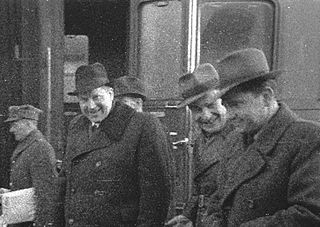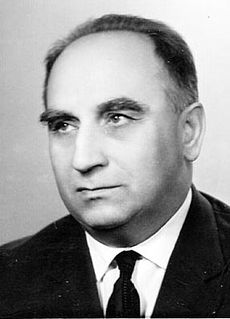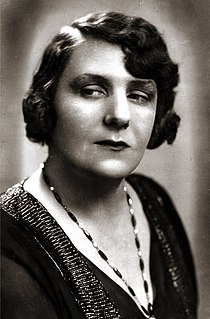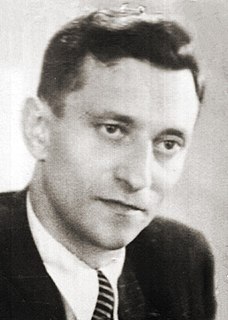 W
WFerdynand Marek Arczyński, cryptonym "Marek" or "Lukowski", was one of the founding members of an underground organization Żegota in German-occupied Poland, from 1942 to 1945. Żegota's express purpose was to help the country's Jews survive the Holocaust; find places of safety for them, and provide relief payments to thousands of families. Poland was the only country in occupied Europe with such an organization during World War II.
 W
WAdolf Avraham Berman was a Polish-Israeli activist and communist politician.
 W
WBolesław Bierut was a Polish politician, communist activist and leader of the Polish People's Republic from 1947 until his death in 1956. He was President of the State National Council from 1944 to 1947, President of Poland from 1947 to 1952, General Secretary of the Central Committee of the Polish United Workers' Party from 1948 to 1956 and temporarily Prime Minister of Poland from 1952 to 1954. Bierut, a self-taught man, with full knowledge and iron resolve aimed to implement the Stalinist system in Poland. Together with Władysław Gomułka, his main rival, Bierut is chiefly responsible for the historic changes that Poland underwent in the aftermath of World War II. Unlike any of his communist successors, Bierut ruled Poland until his death.
 W
WJerzy Borejsza was a Polish communist activist and writer. During the Stalinist period of communist Poland, he was chief of a state press and publishing syndicate.
 W
WJulia Brystiger was a Polish-Jewish communist activist and member of the security apparatus in Stalinist Poland. She was also known as Julia Brystygier, Bristiger, Brustiger, Briestiger, Brystygierowa, Bristigierowa, and by her nicknames – given by the victims of torture: Luna, Bloody Luna, Daria, Ksenia, and Maria. The nickname Bloody Luna was a direct reference of her Gestapo-like methods during interrogations. Her pen name was Julia Preiss. Author of several books.
 W
WBolesław Drobner was a Polish politician. A member of the Polish Socialist Party, he supported cooperation with the communists. Arrested by the NKVD after the Soviet invasion of Poland, in 1943 he was released. Drobner joined a pro-Soviet Polish communist organization the Union of Polish Patriots and later the Polish Committee of National Liberation (PKWN). As leader of the "Lublin Poles", he led a delegation to Żagań on 13 May 1945 where he pledged allegiance of his town to the Soviet Union.
 W
WWładysław Gomułka was a Polish communist politician. He was the de facto leader of post-war Poland from 1947 until 1948. Following the Polish October he became leader again from 1956 to 1970. Gomułka was initially very popular for his reforms; his seeking a "Polish way to socialism"; and giving rise to the period known as "Gomułka's thaw". During the 1960s, however, he became more rigid and authoritarian—afraid of destabilizing the system, he was not inclined to introduce or permit changes. In the 1960s he supported the persecution of the Catholic Church, intellectuals and the anti-communist opposition.
 W
WStanisław Grabski was a Polish economist and politician associated with the National Democracy political camp. As the top Polish negotiator during the Peace of Riga talks in 1921, Grabski greatly influenced the future of Poland and the Soviet Union.
 W
WJulian Hochfeld was a Polish sociologist. His family originated of German Polish ethnicity, but preferred to stay in new Poland and then assimilated as Polish since the end of World War I. Professor of the University of Warsaw, he is remembered as a major contributor to theories of Polish communism, Marxism and socialism. In his last years he worked for UNESCO.
 W
WHenryk Jan Jabłoński was a Polish Socialist. After 1948, he became a Communist politician, as well as a historian and professor at Warsaw University. He served as head of state of the People's Republic of Poland between 1972 and 1985.
 W
WStefan Jędrychowski was a Polish communist politician, economist and journalist, who served as deputy prime minister, foreign minister and finance minister in Poland.
 W
WFranciszek Wawrzyniec Kamiński, pseudonym: „Olsza”, „Kowal”, „Zenon Trawiński” was a Polish politician and military leader, commander of the Peasant Battalions during World War II. After war he was a member of the State National Council and the Legislative Sejm. Imprisoned for political reasons during the Stalinist period.
 W
WZenon Kliszko, was a politician in the Polish People's Republic, considered the right-hand man of Polish United Workers' Party (PZPR) leader Władysław Gomułka.
 W
WWładysław Kowalski was a Polish communist politician, writer and journalist who served as the Minister of Art and Culture and the Sejm Marshal during the first postwar parliament Sejm of the Polish People's Republic (1947–1952) and, in his capacity as Sejm Marshal, ex officio, as the acting head of state for one day. He was also a publisher and writer.
 W
WLeon Kruczkowski was a Polish writer, publicist and public figure. He wrote books and dramas and was prominent in Polish theatre of the post-World War II period. His best known work is the drama Niemcy, written in 1949.
 W
WStanisław Leon Kulczyński was a Polish botanist and politician.
 W
WStanisław Marian Kutrzeba (1876–1946) was a Polish historian and politician who was Professor of the Jagiellonian University from 1908, and then until the end of his life the Chair of Studies in Polish law. He was chair of the Law Department, university's rector (1932/33), General Secretary of Polish Academy of Learning (1926–39) and its president (1939–1946). He was one of many professors of Jagiellonian University arrested by Nazis during Sonderaktion Krakau in 1939. After being freed in 1940, he took part in the underground education. In 1945, he was deputy to the State National Council.
 W
WStanisław Leszczycki was a Polish geographer.
 W
WMieczysław Michałowicz was a Polish social and political activist, medical doctor of pediatrics, and professor of the Warsaw University.
 W
WKazimierz Romuald Mijal was a Polish communist politician and dissident, best known for founding the illegal Communist Party of Poland (Mijal) in opposition to the Polish United Workers' Party (PUWP) in 1965. He was born in Wilków Pierwszy.
 W
WStanisław Mikołajczyk was a Polish politician. He was a Prime Minister of the Polish government in exile during World War II, and later Deputy Prime Minister in post-war Poland until 1947.
 W
WZygmunt Modzelewski was a Polish communist politician, professor, economist and diplomat.
 W
WZofia Nałkowska was a Polish prose writer, dramatist, and prolific essayist. She served as the executive member of the prestigious Polish Academy of Literature (1933–1939) during the interwar period.
 W
WStanisław Osiecki was a Polish politician. Activist of the peasant movements, member of the Polish People's Party, he was a deputy to Polish Sejm both before and after World War II, and a minister in several cabinets of the Second Polish Republic.
 W
WEdward Bolesław Osóbka-Morawski (listen) was a Polish activist and politician in the Polish Socialist Party (PPS) before World War II, and after the Soviet takeover of Poland, Chairman of the Communist-dominated interim government, the Polish Committee of National Liberation formed in Lublin with Stalin's approval.
 W
WKarol Michał Popiel was a Polish politician of the christian democracy tendency and writer. During World War II Popiel served as Minister of Justice from 1941 to 1942 and Minister for the reconstruction of public administration from 1943 to 1944 in Polish government in exile. After the end of war, he was a leader of Labor Party from 1945 to 1946.
 W
WJulian Przyboś was a Polish poet, essayist and translator, one of the most important poets of the Kraków Avant-Garde.
 W
WMichał Rola-Żymierski was a Polish high-ranking Communist Party leader, communist military commander and NKVD secret agent. He was appointed as Marshal of Poland by Joseph Stalin, and served in this position from 1945 until his death. He supported the 1981 imposition of Martial law in Poland.
 W
WWincenty Rzymowski was a Polish politician and writer. Rzymowski was one of the many faces of Stalinism in postwar Poland.
 W
WMichal Shuldenfrei was a Polish Jewish politician, lawyer, a delegate to the first Sejm of post World War II Poland.
 W
WWłodzimierz Sokorski was a Polish communist official, writer, military journalist and a Brigadier General in the People's Republic of Poland. He was the Minister of Culture and Art responsible for the implementation of the socialist realist doctrine in Poland. During World War II he escaped to the Soviet Union.
 W
WEmil Sommerstein was a Polish-Jewish lawyer, philosopher, activist and politician.
 W
WMarian "Marek" Spychalski was a Polish architect in pre-war Poland, and later, military commander and a politician. During World War II he belonged to the Polish underground forces operating within Poland and was one of the leaders of the resistance movement Gwardia Ludowa, then Armia Ludowa.
 W
WKarol Wacław Świerczewski was a Polish and Soviet Red Army general and statesman. He was a Bolshevik Party member during the Russian Civil War and a Soviet officer in the wars fought abroad by the Soviet Union including the one against Polish as well as Ukrainian Republics and in Republican Spain. In 1939 he participated in the Soviet invasion of Poland again. At the end of World War II in Europe he was installed as one of leaders of the Soviet-sponsored Polish Provisional Government of National Unity. Soon later, Świerczewski died in a country-road ambush shot by the militants from OUN-UPA. He was an icon of communist propaganda for the following several decades.
 W
WCzesław Wycech (1899–1977) was a Polish activist, politician and historian. He was a member of the Polish peasant's parties: the Polish People's Party "Wyzwolenie", the People's Party, the Polish People's Party, and the United People's Party. During World War II he was a member of the Polish Underground State, responsible for organizing underground education. He was the Minister of Education in the Council of National Unity (1945–1947). Within the People's Republic of Poland, he was a member of the Polish parliament (Sejm) and also held other governmental posts.
 W
WRoman Zambrowski was a Polish communist politician.
 W
WAleksander Zawadzki, alias Kazik, Wacek, Bronek, One was a Polish communist politician, first Chairman of the Council of State of the People's Republic of Poland, divisional general of the Polish Army and the head of the Council of State of the Polish People's Republic from 1952 to 1964.
 W
WStefan Jakub Żółkiewski was a Polish theoretist, historian of literature and literary critic. He was born and died in Warsaw. He was a co-founder of the Polish Workers' Party, editor-in-chief of Kuźnica (1945–1948), Polityka (1957–1958), Minister of Higher Education (1956–1959), director and professor of Polish Academy of Sciences and professor of Warsaw University.
 W
WZygmunt Żuławski was a Polish politician, association activist, and socialist. He was a member of:Polska Partia Socjalno-Demokratyczna Galicji i Śląska Cieszyńskiego, since 1904 Polska Partia Socjalistyczna, 1919-1939 Polska Partia Socjalistyczna - Wolność-Równość-Niepodległość, 1940-1945 Komisja Centralna Związków Zawodowych, 1922-1939 Odrodzona Polska Partia Socjalistyczna, 1945–1946.